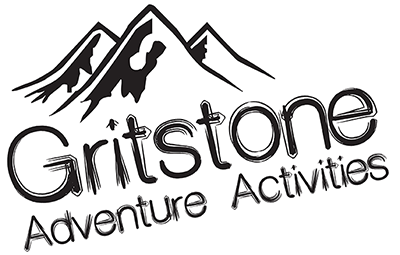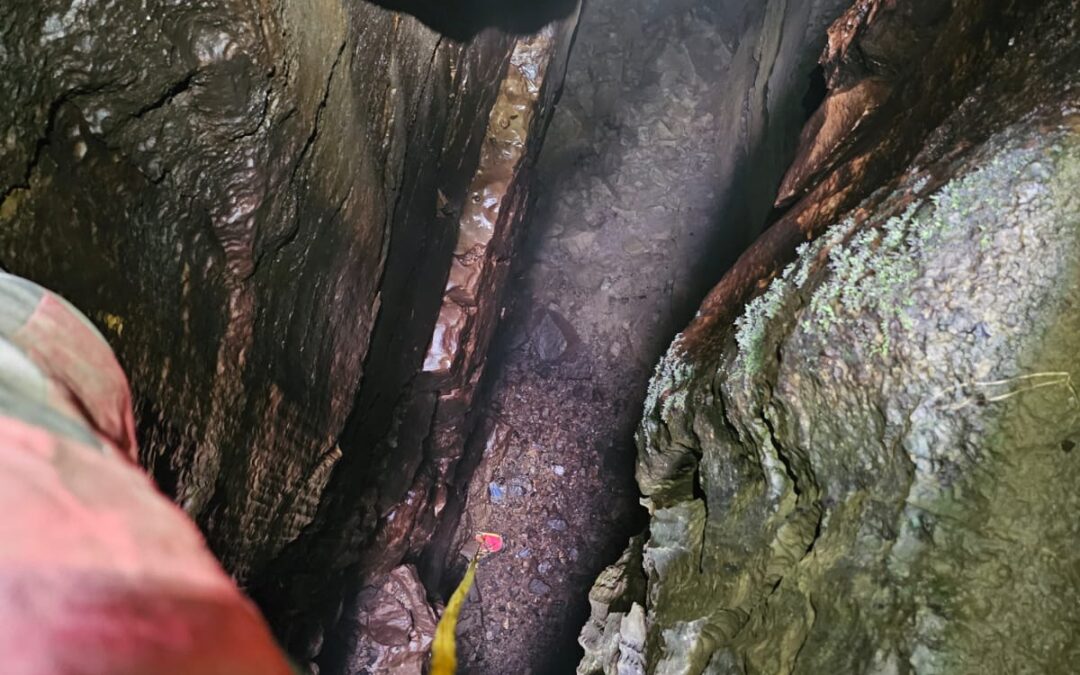
by Alan | Sep 12, 2023 | Discussion
Adventurous Activities often include exposure to height, with climbing and mountaineering being the first activities to conjure visions of vertigo in the mind. Although in reality most adventurous outdoor activities involve coping with heights in some way; caving, hill walking, canyoning and even a more adventurous Kayaking. People are often surprised that caving makes the list of at-height activities as we imagine storybook scenes of an arched cave entrance leading to a horizontal passage into a hillside. Of course, it is possible to do more gentle horizontal underground walks, but in reality we have hundreds of caves in the UK that involve vertical passages only accessible by long abseils of 50, 60 and 70 metres or more. In fact, the Peak District’s “Titan” has the UK’s longest drop of 141 metres, that’s around the height of the Blackpool tower.
So how do we set about Enjoying Heights? I think we can divide people into three categories based upon their ability to cope with heights; those that partake in at-hight activities purely for because they want to be high. Those that tolerate heights in order to get their reward; reaching the top of a mountain, or getting to the bottom of a cave because they want to see what’s there. And there are those that just hate heights and believe they can never tolerate them. However, three types have one thing in common – they are not born to love heights and if they say they are they are not telling the truth!
Becoming comfortable with heights is learned. Some people will become comfortable with heights sooner than others, it’s true, but every individual need to develop a number of techniques to be able to function at height. This is done in a number of ways. Just like a muscle, the brain needs to be exercised by a regular and continued exposure to height. Even the boldest climbers will need a period of “getting their head in” to heights after a long break. They will do this by easing into shorter climbs before going for the bigger ones. Continued exposure (without accident of course) builds up confidence and, just like a strong muscle, the brain will use less energy worrying about its situation leaving a clear mind to think rationally about where we are and what to do. Skill at height: Whatever activity at height you are doing – let’s say vertical caving – there will be a plethora of technical skills all designed to keep you from hitting the ground. If you are shaky at these skills or know you have gaps in your skill set, this will affect your confidence at height. Being slick and well-practiced in rope skills for example will fill you with confidence. Knowing, for sure, that your skills can get you out of a situation will fortify your confidence and leave you enjoying your lofty situation rather then dreading it. Equipment knowledge is also important for coping with heights. If you are abseiling from steel bolts in a cave and you know that the bolt can hold a metric done of weight, and you are attached to two of them – this will instil confidence. Knowing that your rope can suspend a family car without breaking, knowing that your harness would hold the weight of ten adults… leaves you feeling much safer. So you need to do your homework and learn what you equipment is capable of. All of this equipment knowledge, built up over a period of time allow you to enjoy where you are.
There isn’t a person alive who can look into a black, bottomless void or peer down a precipitous cliff without feeling their pulse increasing, isn’t that why we do it? And you can be sure that those seemingly superpowered heroes who seem immune to height have felt the fear at points in their vertical hobbies. But anyone can control their instinctive fear of heights with three practical steps: Training, experience and knowledge. It’s time to start training your brain and enjoying heights.
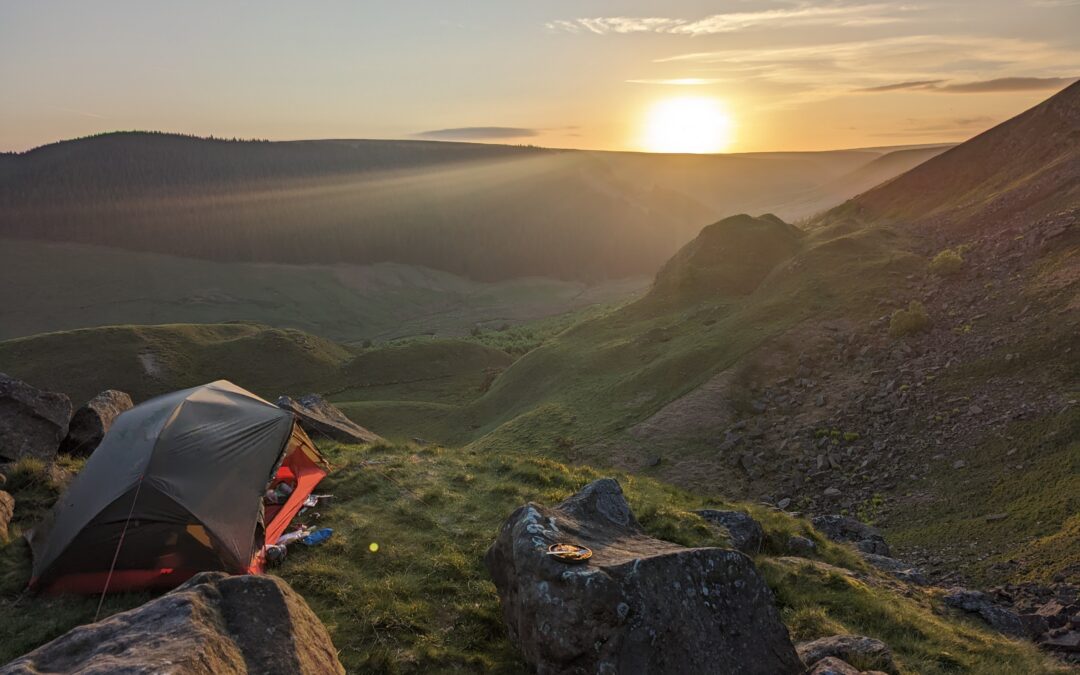
by Alan | Aug 18, 2023 | Discussion, Wild Camping
Freedom. Isn’t this what we all crave? And by freedom I don’t mean in the political sense, I mean freedom to roam and explore our own land; our own wilderness. Many don’t associate our small island with wilderness, people think of wilderness as being in far flung countries; desert, mountains and the like. But if we take some time explore our national parks, really explore them, our open spaces seem to become bigger and wilder as we explore more. We can do this by hillwalking of course and hillwalking is a wonderful way to spend the day and appreciate what we have. With hillwalking, however, we are always passing through. Sure, we can stop with a flask and sandwich, take some time and soak it up. However, to really appreciate the wild, it’s better to live in it for a short while. Putting up a tent and staying the night is living wild, even just for one night. By stopping and making a temporary home in the wild we can really begin to soak it up; watch the toing and froing of wildlife, see the arc of the sun casting ever changing shadows and listen; really listen. Wild camping, of course is the best way to do this. Sending multiple nights wild camping really makes the real world, the world of concrete and tarmac, melt away into the background. Living simply too, with just the basics in life; food, shelter and a warm sleeping back allows us to discard the clutter of modern life, take it back to basics. By spending time with just what you need to stay comfortable clears the mind and allows us to focus on what’s important in life. This is what wild camping brings and it’s the ultimate natural mental health care.
If we are going to talk about wild camping we need to talk about legalities. In England the only place you can officially legally wild camp is on Dartmoor in the South West. Even then, a landowner managed to ban it on a certain area of the moor – thankfully this ban was overturned in court, you can read more about that here.
So how do we do we wild camp if it’s not legal? Well in the rest of England wild caping is tolerated in national parks as long as it’s done responsibly and discreetly. This means camping away from the road and out of sight. It also means leaving no trace; no litter, no disposable BBQ use and only leaving a flattened patch of grass behind. Trespass is a civil offence meaning that even if you are approached by a landowner, they can’t physically move you on and you can’t be arrested by police for it (not that the police patrol the hills anyway). This however, is academic as in my 20+ years of wild camping I’ve never been approached, or spoked to by any landowner, famer, ranger or anyone else – and this is because I do it responsibly as I’m sure you would too.
So if you are thinking of camping wild, I really recommend it as away to connect with nature and get the best from our beautiful land – just be respectful an above all; leave no trace. Vango have a great article about leave no trace ethics here. Alpkit also have a great article about leave no trace principles here.
Enjoy the wild.
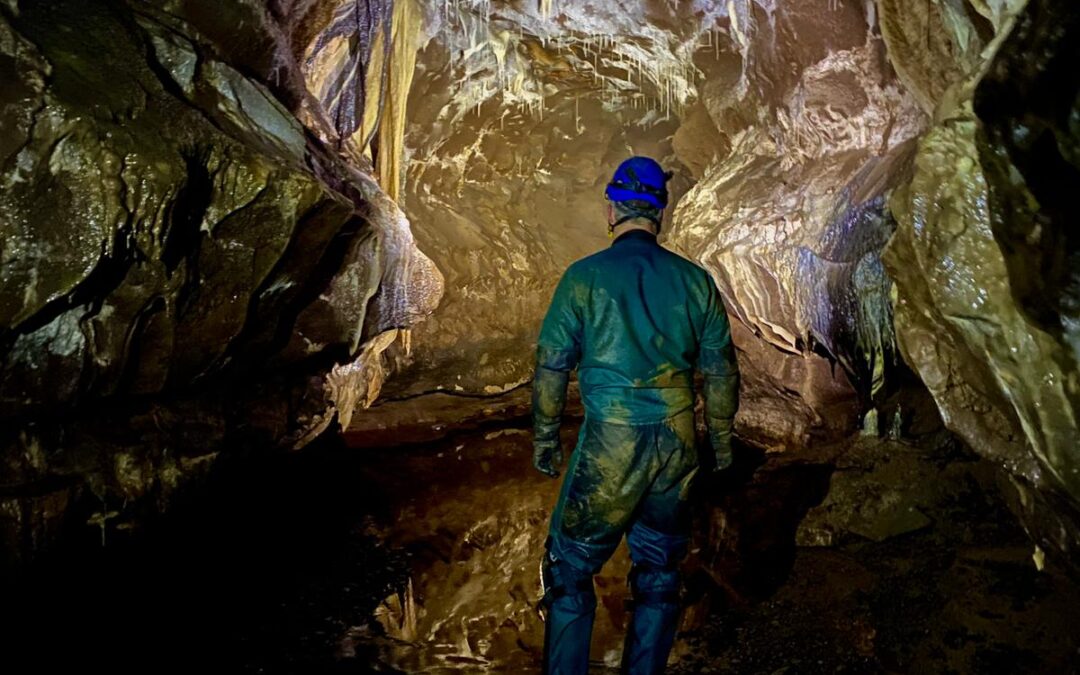
by Alan | Aug 16, 2023 | Discussion
Mention caving to a person in the street and they’ll most probably frown and say “you’d never get me in a cave.” To that I’d answer “you’re missing out.” Caving gets a bad press. In recent years there’s been a string of cave-based horror films such as The Descent and then a Thai football team trapped in a flooded cave. Every few years the media plays upon people’s already entrenched fears of the underground. There’s also a feeling that all caving is extremely tight, very wet and generally miserable.
It’s true to some extent – some caves are tight, muddy and miserable but not all of them and if you aren’t into that kind of thing then you just don’t go into those caves. The truth is that there are caves of all flavours. Some caves are very vertical and challenging, but some are horizontal – nothing more than a walk underground. Some caves are so astonishingly huge that you can spend several hours underground without ever touching the sides.
What nearly all caves have in common is that they are places of amazing natural beaty. Caves are a haven from human development and what you are looking at is a place that has been that way for tens of thousands of years, secret places full of seclusion and wonder. I’ve been involved and every outdoor activity there is over the years but it’s only caving which continues to surprise me and I still have regular genuine moments where my breath is taken away. Underground waterfalls, impossible rock formations, pristine fossils. Most importantly for me caving allows me to feel a genuine feeling of exploration – which in our small and overpopulated country, is a rare thing. We can take you to these places whatever your ability or expectation here.
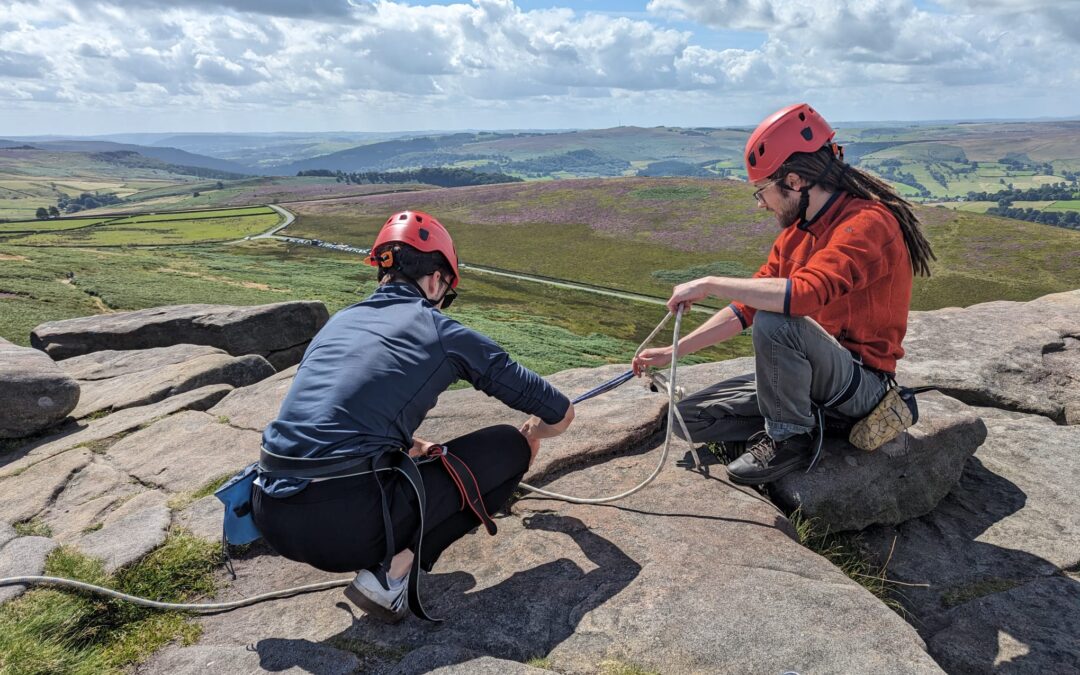
by Alan | Apr 19, 2023 | Discussion
Indoor climbing walls are great for training, great for socialising and a perfect place to begin climbing. But really, climbing isn’t all about the physical act of ascending a wall. Climbing is about being immersed in the environment, not only because we have some of the most beautiful scenery in the world here in the UK, but also for the sounds of mountain and moorland, the smell of the heather and the tactile feel of hundred million year old rock. Climbing is an outdoor activity.
Many of our climbing customers are regular indoor climbers who come to us to make the transition to outdoor climbing. Outdoor climbing to the beginner can seem daunting. Those wishing to break into outdoor climbing will have seen climbing magazine pics and Instagram posts of climbers ascending crags and cliffs and notice a bewildering array ropes, knots and equipment – wondering how it all works. It’s easy to feel like outdoor climbing with ropes takes many years of experience to understand, but the fact is – it’s not complicated. Most beginner climbers can pick up ropework, knots and equipment use really quickly – they just need to be shown.
Climbing outside is about climbing, it’s not all about fancy ropework and shiny gear. My advice is don’t be put off by not having technical skills at the start; if you have climbing within you but you are nervous about making the leap to outdoor climbing, then just go ahead and do it – you just need a small amount of guidance first. If you have the will to climb then you’ll be able to get competent enough to become an independent outdoor climber. A good way into outdoor climbing is to join a climbing club, the BMC is the best resource for this here: BMC. If you’d like more personalised, tailored and faster way in to outdoor climbing we run very poplar, tailor made rock climbing courses here Climbing Courses Peak District If you need to chat about your options just drop me an email – my name’s AL. al@gritstoneadventures.co.uk

